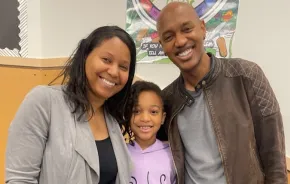 My 7-year-old son’s first chess tournament was my idea. My intentions were innocent: to have Ty meet kids who loved chess as much as he did. And Ty, who’s competitive and outgoing, thought it might be fun, too.
My 7-year-old son’s first chess tournament was my idea. My intentions were innocent: to have Ty meet kids who loved chess as much as he did. And Ty, who’s competitive and outgoing, thought it might be fun, too.
At least that’s what he said.
But when we walked into the large, noisy room filled with cafeteria tables and mingling families, Ty slipped his hand into mine and stood silent, watching. I could feel him freeze up. The table of trophies didn’t help. No doubt they would be awarded in public fashion to those who won, passing over those who didn’t. It all seemed so, well, serious.
The first game was announced and we helped Ty find his chessboard and opponent, but I felt guilty. He was still nervous. “Just have fun,” I whispered before walking away. Ty gave me a pained smile.
I hadn’t intended Ty to feel pressured — did he feel pressured? He loved games, and he’d always been a good sport about the outcome, which made him a fun opponent to play. He discovered chess at 4. As I taught his 6-year-old sister the game, he hovered next to us. “Can I play?” he asked. So I taught him the moves.
“Let’s play chess,” he would say. Every day. Several times a day. He loved the shape of the pieces and the different ways they moved. By first grade, his dad had taken over the play, teaching himself and Ty strategy out of books. Ultimately it was the game’s strategy Ty grew to love most.
Ty won two and half games at that first tournament, the last one a stalemate worth half a point. After the first bout of jitters, he became so engrossed he forgot to be nervous. The trophy was unexpected gravy — awarded for sportsmanship because Ty had allowed a game to continue after his opponent resigned (if you resign, you lose). What better quality to honor than sportsmanship?
But that trophy set the stage for an entirely different kind of behavior.
As Ty went to more tournaments, won more games, and earned more trophies, he began to strut. After each tournament, he pestered us to check his rating online for him. “Did you know my rating is already 760 and I’ve only been to four tournaments?” he announced to a coach he didn’t know.
Oh dear. At home, he would boast, “I must be pretty smart” — despite our frequent reminders that his successes came from hard work.
When he lost — and he did — he sometimes made excuses. Other times, especially when he thought he might not earn a trophy, he would drop into a funk that clouded the rest of the day.
When had winning and bringing home a trophy become everything? I began to worry competition was bad for someone so young. We relied on the old adage “winning isn’t everything,” but it sounded hollow to me. Wasn’t there a more nuanced approach? Surely Ty couldn’t help but notice at tournaments that parents were happy when their kid won. Winning felt good to him, too.
“He’s young yet,” another chess parent reminded us. “He’ll outgrow it.”
In psychologist Carol Dweck’s book, Mindset: The New Psychology of Success, I found an anecdote that could have been our family: a young boy who plays chess and lauds himself for being smart. Hmmmm.
When I described Ty’s attitude about winning to Dweck, she told me kids can feel they’re letting their parents down when they don’t win, especially if parents promote winning, but even when they don’t. Temperament can also be a factor.

Was Ty worried about letting us down, I wondered aloud? Possibly, she said. Another possibility, she suggested, was that Ty’s being good at chess made him feel special. “If kids then go up against other kids who beat them, they feel they’re really losing something precious about themselves,” she said.
Oh. So perhaps winning was about holding onto his sense of self-worth — his budding identity as a good chess player. I recalled a conversation when Ty had indicated he felt pressure from his schoolmates, who congratulated him whenever he brought in a trophy to share. “Kids think I’m the best, Mom, and I’m not. They don’t know how tournaments work,” he said. Maybe sharing trophies wasn’t the best idea.
According to Dweck, around age 7 kids become more performance conscious and peer oriented — how did I do relative to others? — but whether they use it to measure and label themselves, or whether they use it to learn, makes a difference in their attitude to winning and losing.
If Ty’s focus on winning was any indication, he was doing some heavy-duty measuring and labeling. So I often reminded Ty that win or lose, we loved him. We made sure to compliment effort and tough games rather than outcomes. Instead of saying “Did you win?” as I’ve heard countless times, we said, “Tell us about the game.”
What seemed to help most, though, was Ty’s realization that even top kids lost games, and it wasn’t the end of the world. “Wow, Mom, did you know Collin lost his first game to a much lower rated player? He’s the highest rated player here.” And no one thought less of Collin.
Finally, and I didn’t plan this, Ty went out for recreational soccer, his first team sport. His team welcomed him, and parents he didn’t know cheered as he galloped up and down the field. No one talked about the score. Playing as a team (with a low-key coach) allowed Ty to experience winning and losing without feeling responsible for the outcome.
By the following year, Ty seemed to have outgrown the intense need to win. He still loved it, don’t get me wrong, but his losses — on the board or on the field — didn’t ruin his day. These days, though, just in case, we still talk about effort and persistence, and we remind him we love him no matter what the outcome.
About the author: Joanna Nesbit’s son, now 14, thinks chess is dorky and only plays intermittently online. He still plays soccer.
The emerging sense of mastery
Some children are more competitive than others. It seems like they were born that way. But experts say there is also a discernible rise of competitive streak based on child development, and it helps if parents understand that. Starting at around age 7, children begin to compare themselves to their peers and no longer just look to their parents to define themselves.
“They are figuring out who they are and beginning to notice their differences compared to others, how they fit, what they’re good at, what they’re less good at,” says Linda Mayes, psychiatrist at Yale Child Study Center. Indeed, if a child’s development is going well, says Mayes, he will want to be good at something because his parents will have communicated he has the skills to excel.
Nearer adolescence, a child’s capacity for reflection and self-appraisal matures. He can externalize a loss and understand it doesn’t mean he’s a failure, a sign he’s developing a more integrated sense of self. Still, winning and losing can be an emotion-laden experience, even for adults.
How to raise a good sport
 How do we help our kids handle competition in a positive way? Psychologist Carol Dweck and Ellen Galinsky, president of Families and Work Institute, offer the following suggestions for parents:
How do we help our kids handle competition in a positive way? Psychologist Carol Dweck and Ellen Galinsky, president of Families and Work Institute, offer the following suggestions for parents:
• Praise effort and persistence, not talent or intelligence. Praising innate abilities can back-fire when the child hits a bump and would rather quit than fail her parents.
• Avoid over-praising or analyzing a game so every performance isn’t about pleasing a parent.
• Demonstrate your belief that mistakes are OK. Not only are they an important part of learning, making mistakes is the only way to improve at something.
• Talk about a disappointing outcome but don’t try to fix it. It’s important for both parents and kids to accept that disappointment is part of competition.











